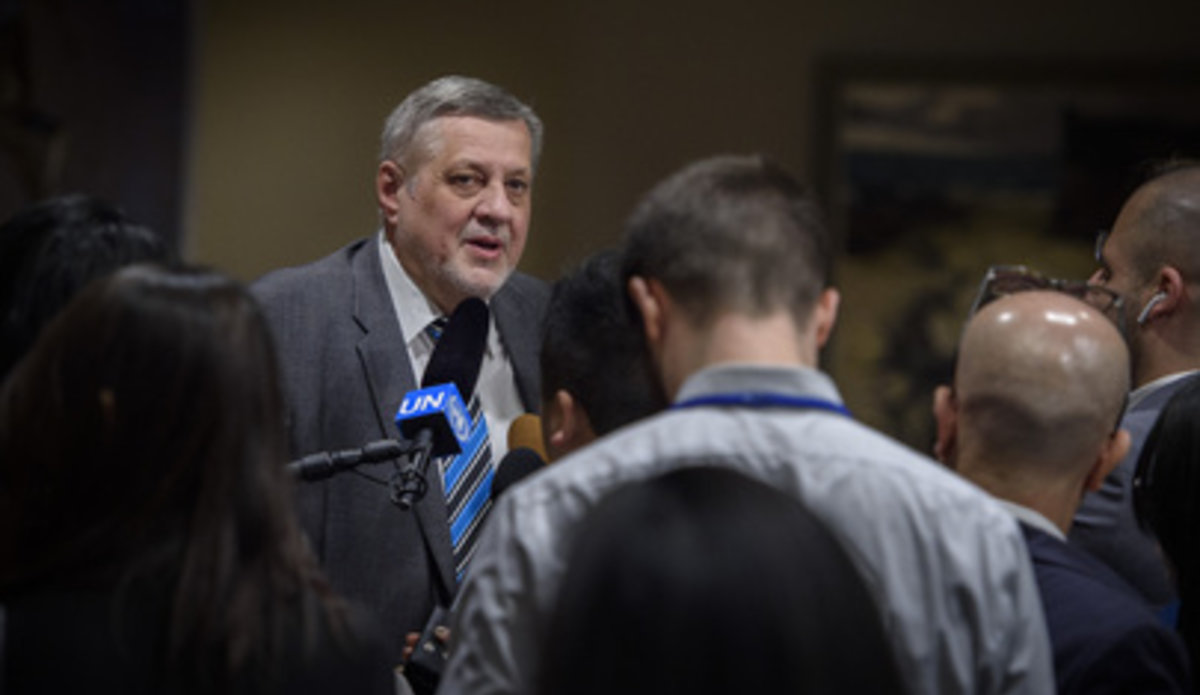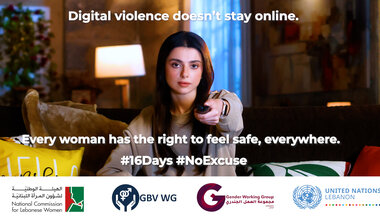UN Special Coordinator for Lebanon Jan Kubis Press Stakeout Following UN Security Council Consultations on Resolution 1701
First of all, I am very glad that in my new capacity as the Special Coordinator for Lebanon, I had the opportunity to brief the Security Council about my activities but notably about the country, about Lebanon. I spoke about opportunities and some risks as well.
Opportunities, and I believe that it was recognized very clearly by members of the Security Council: The Government is there, the programme of the Government is there, a programme that is very solid, speaks about reforms, speaks about what to do and how to work. So, all of that was very much recognized and encouraged. It was one of the messages that I heard is a need to use the goodwill of the international community to support Lebanon and that was manifested in past days, past weeks through different visits as well and before that by different international conferences and to pursue the reform agenda. Deep reforms are needed for the benefit of the country and the people of the country because there were a lot of economic issues. That was one big block of opportunities and encouragement. I was very glad that a number of delegations also recognized, acknowledged the fact that there are four women in the Government, including the first Minister of Interior in the whole region, a woman and a very strong minister, I would say. I had a meeting with her and she has absolute clarity about what to do and how to do it and I am very much encouraged by that. Strong international support, as I said, is there. So all of that is on the side of opportunities.
I mentioned also certain risks, first again economy. Economic, social issues, it is obvious from my meetings in the past six weeks that this is very high in the agenda of the government . Hopefully soon the Government will adopt the budget and the budget that hopefully will send a very strong signal that it is a reform budget.
Secondly, I briefed about all the discussions and disputes that are sometimes happening around the topic of return of Syrian refugees. It is a discussed topic and I mentioned this also because I registered that there is a national consensus even, political consensus among the major political parties, in favour of return of Syrian refugees back home. There is another big discussion about how to do it, if there is room to do it, how to cooperate and there is another topic about how to shape relations between Lebanon and Syria as such. And this is a divisive topic. There is basic unity that refugees must return. So that is the second area.
Of course, I mentioned regional developments that are affecting the situation in Lebanon. And from that perspective, of course I believe that the Security Council had a number of discussions about regional developments and will have a number of discussions. Even just now I saw His Excellency the Ambassador of Syria waiting for that. So no question that regional developments are very strongly on the agenda. And from that perspective, many of those that took the floor, members of the Security Council, were bringing to our attention, and through me most likely to the attention of the leadership of the country, the implementation of steps that would ensure increased control of weapons by the State and increased control of any supplies of arms and of course activities of different armed groups that are still outside the control of the State.
So that was happening, that was quite a discussion. All in all, I was happy to hear a message of support of the members, united support of the members of the Security Council for Lebanon.
QUESTION: Regarding the issue of Syrian refugees that you mentioned, the national consensus …
SCL Jan Kubis: Political consensus.
QUESTION: People tend to agree that the refugees should go back. Are you worried that, now you are communicating with Mr. Pedersen and with UNHCR, because of that feeling in Lebanon that people might be pushed back into Syria where it is not safe for them to go?
SCL Jan Kubis: Let’s put it like this, the position of the UN and I am also working on this although of course I leave the field to our humanitarian community and Humanitarian Coordinator, but you know that we cannot in any way differently, only to stress the principles of safe, voluntary and dignified return. You cannot expect from the UN, any side or any part of the UN, to do and think in any other different way. Yes, as I said, there is a discussion and a dispute and yes there might be some individuals tempted to maybe propose some other approach but I would say that at this point in time in practice everything is done according to the principles of safe, voluntary and dignified return. And I assume that this practice will be continued.
QUESTION: One final question on the other aspect you mentioned, the regional aspect. Given the situation in Gaza and given the US recognition of Golan, as you know in this region things tend to have unexpected consequences. How worried are you, given the fragility of Lebanon?
Note: Latest Report of UN Secretary-General Antonio Guterres on Security Council Resolution 1701
المنسق الخاص للأمم المتحدة في لبنان يان كوبيش
تصريح للإعلام عقب مشاورات مجلس الأمن حول القرار 1701
مقر الأمم المتحدة، نيويورك
27 آذار 2019
في البداية، أنا سعيد للغاية لأنها أتيحت لي الفرصة بصفتي المنسق الخاص للأمم المتحدة في لبنان، لاطلاع مجلس أمن الأمم المتحدة على أنشطتي ولكن بشكل خاص حول لبنان. تحدثت عن الفرص وبعض المخاطر أيضاً.
الفرص، وأعتقد أنه تم الاعتراف بها بوضوح من قبل أعضاء مجلس الأمن: الحكومة موجودة، برنامج الحكومة موجود، برنامج قوي للغاية، يتحدث عن الإصلاحات، ويتحدث عما يجب القيام به وكيفية العمل. لذلك، كل هذا تم الاعتراف به وتشجيعه. كانت إحدى الرسائل التي سمعتها هي الحاجة إلى استخدام حسن نية المجتمع الدولي لدعم لبنان وذلك تجلى في الأيام الماضية، خلال الأسابيع الماضية من خلال زيارات مختلفة وكذلك وقبل ذلك من خلال مؤتمرات دولية مختلفة ومتابعة جدول الإصلاح. هناك حاجة لإصلاحات عميقة لصالح البلد والشعب بسبب وجود الكثير من القضايا الاقتصادية. فكانت تلك كتلة كبيرة من الفرص والتشجيع. وكنت سعيداً جداً لأن عدداً من الوفود اعترفت أيضاً وأقرت بحقيقة وجود أربع نساء في الحكومة، بما في ذلك أول وزيرة داخلية في المنطقة بأكملها، أستطيع أن أقول انها امرأة ووزيرة قوية للغاية. لقد التقيت بها ولديها وضوح تام حول ما يجب القيام به وكيفية القيام بذلك، وهذا الأمر شجعني كثيراً. الدعم الدولي القوي، كما قلت، موجود. لذلك كل هذا يقع في جانب الفرص.
ذكرت أيضاً بعض المخاطر، الاقتصاد مرة أخرى. القضايا الاقتصادية والاجتماعية، من الواضح من اجتماعاتي في الأسابيع الستة الماضية أن هذا الأمر يحتل مكانة عالية جداً في جدول أعمال الحكومة. نأمل أن تقر الحكومة قريباً الميزانية التي نأمل أن ترسل إشارة قوية بأنها ميزانية إصلاح.
ثانياً، أطلعت المجلس على المناقشات والخلافات التي تحدث أحياناً حول موضوع عودة اللاجئين السوريين. إنه موضوع يتم مناقشته وقد ذكرت ذلك أيضاً لأنني لاحظت أن هنالك توافقاً وطنياً، توافقاً سياسياً بين الأحزاب السياسية الرئيسية، لصالح عودة اللاجئين السوريين إلى وطنهم. هناك نقاش كبير حول كيفية القيام بذلك، إذا كان هناك مجال للقيام بذلك، وكيفية التعاون، وهناك موضوع آخر حول كيفية تمحور العلاقات بين لبنان وسوريا. وهذا موضوع مثير للخلافات. هناك اتفاق أساسي حول وجوب عودة اللاجئين. فإذاً هذا هو موضوعنا الثاني.
بالطبع، ذكرت التطورات الإقليمية التي تؤثر على الوضع في لبنان. ومن هذا المنظور، بالطبع، أعتقد أن مجلس الأمن أجرى عدداً من المناقشات حول التطورات الإقليمية وسيجري عدداً من المناقشات. الآن رأيت سعادة سفير سوريا في انتظار ذلك. لذلك لا شك أن التطورات الإقليمية تحتل مكانة قوية في جدول الأعمال. ومن هذا المنظور، كان العديد من أولئك الذين القوا كلمات، من بين أعضاء مجلس الأمن، لفتوا انتباهنا، ومن خلالي على الأرجح انتباه قيادة البلاد، إلى تنفيذ الخطوات التي من شأنها ضمان زيادة السيطرة على الأسلحة من قبل الدولة وزيادة السيطرة على أي إمدادات للأسلحة وبالطبع أنشطة الجماعات المسلحة المختلفة التي لا تزال خارجة عن سيطرة الدولة.
فإذاً كان ذلك نقاشاً مهماً لا بأس به. في العموم، كنت سعيداً لسماع رسالة دعم من الأعضاء، دعم موحد من أعضاء مجلس الأمن للبنان.
سؤال: فيما يتعلق بقضية اللاجئين السوريين التي ذكرتها، الإجماع الوطني ...
المنسق الخاص يان كوبيش: اجماع سياسي.
سؤال: يميل الناس إلى الاتفاق على أن اللاجئين يجب أن يعودوا. هل تشعر بالقلق من ذلك، فأنت الآن تتواصل مع السيد بيدرسن ومع مفوضية الأمم المتحدة السامية لشؤون اللاجئين، بسبب هذا الشعور في لبنان بأن الناس قد يتم إعادتهم إلى سوريا حيث ليس آمناً لهم الذهاب؟
المنسق الخاص يان كوبيش: دعونا نضع الأمر على هذا النحو، موقف الأمم المتحدة، وأنا أعمل أيضاً في هذا الخصوص على الرغم من أنني بالطبع أترك المجال لمجتمعنا الإنساني ومنسق الأمم المتحدة للشؤون الإنسانية، أنه لا يمكننا بأي طريقة مختلفة، فقط التأكيد على مبادئ العودة الآمنة والطوعية والكريمة. لا يمكنك أن تتوقع من الأمم المتحدة، أي جانب أو أي جزء من الأمم المتحدة، القيام أو التفكير بأي طريقة أخرى. نعم، كما قلت، هناك نقاش وخلاف، ونعم، قد يكون هناك بعض الأفراد الذين قد يسعوا لاقتراح نهج آخر، لكنني أقول أنه في هذه المرحلة من الزمن من الناحية العملية، يتم كل شيء وفقًا لمبادئ العودة الآمنة والطوعية والكريمة. وأفترض أن هذه الممارسة سوف تستمر.
سؤال: سؤال أخير حول الجانب الآخر الذي ذكرته، الجانب الإقليمي. بالنظر إلى الوضع في غزة وبالنظر إلى اعتراف الولايات المتحدة بالجولان، كما تعلمون في هذه المنطقة تميل الأمور إلى عواقب غير متوقعة. ما مدى قلقك، بالنظر إلى هشاشة لبنان؟
المنسق الخاص يان كوبيش: أود القول إنه إلى حد كبير، هناك اهتمام قوي، وهذا افتراضي وتقييمي، حول عدم الذهاب بعيداً في زعزعة استقرار الوضع. الجميع يهتم باستقرار لبنان، بما في ذلك دول المنطقة. هذا ما سمعت ايضا في اسرائيل. لذلك من هذا المنظور، أنا أتابع هذا الموضوع بالطبع بقلق معين، لكنني لا أعتقد أننا يجب أن نتوقع أي عدم استقرار تام.
تقرير الامين العام للأمم المتحدة حول القرار 1701
***
 UN
UN





